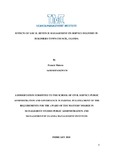| dc.contributor.author | Matovu, Francis | |
| dc.date.accessioned | 2019-09-26T10:18:35Z | |
| dc.date.available | 2019-09-26T10:18:35Z | |
| dc.date.issued | 2018-02 | |
| dc.identifier.citation | Matovu, Francis (2018) Effects of Local Revenue Management on Service delivery in Bukomero Town Council, Uganda | en_US |
| dc.identifier.uri | https://hdl.handle.net/20.500.12305/663 | |
| dc.description.abstract | The study investigated the effect of local revenue management on service delivery in Bukomero
Town Council, Uganda. Its objectives included investigating the effect of revenue enhancement
planning on service delivery; investigating the implementation of the revenue enhancement plan on
service delivery and investigating the effect of revenue expenditure control on service delivery. The
study adopted a cross sectional and correlation survey design complemented with a qualitative and
quantitative approach. The study population was 176 and 124 formed the sample size selected using
the purposive and simple random sampling. Information was elicited using questionnaire, interview
and documentary review checklist. A response rate of 63% was obtained as recommended by Amin
(2005). Key findings suggested a positive significant relationship between revenue enhancement
planning (.530**), implementation of the revenue enhancement plan (.342**) and revenue
expenditure control (.472**) on service delivery. The study concluded that untimely revenue
enhancement planning and fewer local revenue sources negatively affects revenue management
however, fair tax assessment and timely deployment of tax enforcement team improve revenue
collection. On the issue of implementation of revenue enhancement plans, it is concluded that local
community had less knowledge about revenue management and needed sensitization; de-motivated
TC staffs underperformed assignments and recruitment at the TC was influenced. Further to note,
revenue expenditure controls gaps negatively affect service delivery while misallocation of funds
was common and quarterly audits and review reports were delayed. The following were
recommendations made namely conduct more on the job trainings; provide logistical support to the
revenue assessment team; budget and clearly identify un tapped revenue sources; conduct more
community dialogue meetings and the need for a more autonomous hiring process. In addition,
engaging more actors in budget revenue meetings or conferences; avoid late submission of reports
and benchmarking. | en_US |
| dc.language.iso | en | en_US |
| dc.publisher | Uganda Management Institute | en_US |
| dc.subject | Effects | en_US |
| dc.subject | Local Revenue Management | en_US |
| dc.subject | Service Delivery | en_US |
| dc.subject | Uganda | en_US |
| dc.title | EFFECTS OF LOCAL REVENUE MANAGEMENT ON SERVICE DELIVERY IN BUKOMERO TOWN COUNCIL, UGANDA | en_US |
| dc.type | Thesis | en_US |

